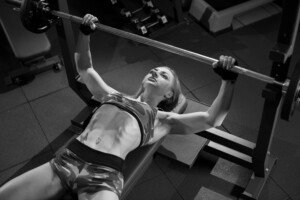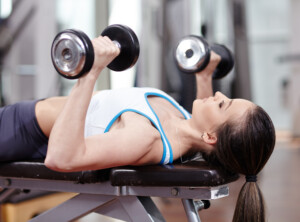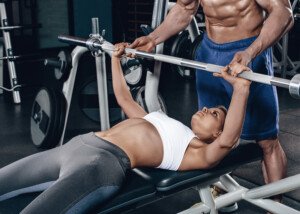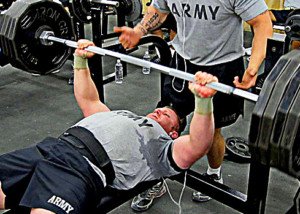
Women need to bench press, but few at any given gym actually do.
If you’re a woman, ask yourself why you don’t bench press.
Here’s an excellent workout for women who want to start bench pressing.
But first, why don’t more women bench press?
- Is it because you avoid the free-weight area altogether? Why?
- Is it due to self-consciousness?
- Women need to question why this self-consciousness surfaces at the thought of exercising in the free-weight area, as opposed to the machine or cardio area.
- The bench press stations are in the free-weight area, and that’s where women need to go.
Another reason for avoiding this all-important exercise may be because, as a woman, you feel you aren’t strong enough to bench press.
But of course you are; use a 20-pound barbell (most gyms have pre-weighted barbells as light as 20 pounds).
When I was a personal trainer at a gym, I encouraged even the weakest women to bench press. Anyone can perform this movement.
If your gym doesn’t have 20-pound bars, then try the Olympic bar without any weights added on; alone, it is 45 pounds.
If this is too heavy, then do dumbbell presses on a flat bench; this simulates barbell pressing enough to prepare you for future benching.

Shutterstock/Catalin Petolea
So if the Olympic bar is too heavy, then see if you can use 20 pound dumbbells, and as you push them up, pretend that they are a barbell.
You may be wondering, why not just stick to dumbbell presses and not do benching?
Dumbbell routines, though they will strengthen a woman’s ability to press weight upwards, yield a different path of muscle recruitment than does barbell pressing.
Women typically struggle with upper body weakness, and thus, women should include both bench and dumbbell press in their workouts. There is no reason to choose.
Benching can also be done on an incline bench; but make sure it is inclined lower than 45 degrees, because the higher it’s raised, the more that the muscle recruitment shifts away from chest and onto shoulders.
Bench pressing will give women more confidence. There is just something about this classic, multi-joint exercise that boosts self-esteem.
Ask any former “90 pound weakling” who committed to this compound exercise what it did for his self-confidence.
Women may be concerned that bench pressing will either make their breasts smaller, or bigger. Neither is true.
Breast size is determined by fatty tissue. Dolly Parton’s breasts are not full of muscle.
Before bench pressing, warm up with light dumbbell work, lying on a bench or stability ball, and pushing the weights upward for 12-20 repetitions.
Do several sets, and go ahead and increase the weights to get more challenge.
Then start bench pressing. If you can push the Olympic bar up only three or four times, that’s fine; set it down and rest a few minutes, then go again.
Nobody says you must do eight reps. Just do your three or four, rest a few minutes, and repeat for several more sets. It won’t be long before you are doing eight reps.
If you can press the bar eight times, see if you can go to 10. The ideal rep range is 8-12, but it must be a difficult rep range for optimal fat loss, toning, shaping and fitness, as well as improved upper body strength.
If 8-12 is easy, see what you can do with 5 or 10 more pounds added to the bar.
Should women have a spotter during bench pressing?
Only if they believe they won’t be able to get the bar back up.
But you’ll know when this point is coming as you progress into the set and the barbell feels heavier and heavier.
Play it safe and set it down if you suspect that the next rep will not be doable.
Do five sets total, and you will feel great afterward. Don’t do triceps or shoulder routines before bench pressing, as these muscles are secondary movers in the exercise, and you don’t want to pre-fatigue them beforehand.
Women will not “bulk up” from bench pressing.
If you see an over-muscular woman performing this exercise, chances are she’s a serious bodybuilder and has a specific training protocol to support her goals.
 Lorra Garrick is a former personal trainer certified through the American Council on Exercise. At Bally Total Fitness she trained women and men of all ages for fat loss, muscle building, fitness and improved health.
Lorra Garrick is a former personal trainer certified through the American Council on Exercise. At Bally Total Fitness she trained women and men of all ages for fat loss, muscle building, fitness and improved health.
.









































